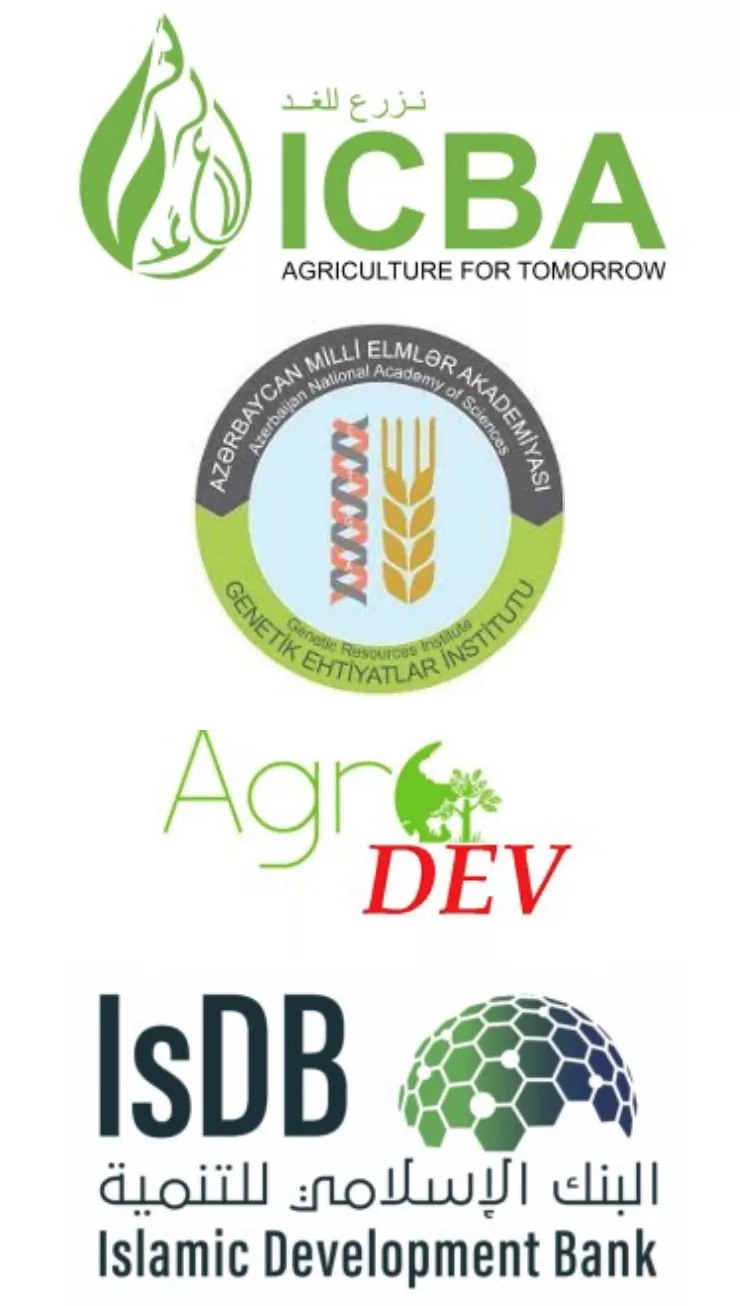Assessment, mapping and utilization of agricultural crops in saline-affected areas in Azerbaijan
Start date:
19 ديسمبر, 2022
End date:
23 ديسمبر, 2022
Venue:
Genetic Resources Institute, Ministry of Science and Education of Republic of Azerbaijan
The Azerbaijan Republic is the largest (with a total land surface area of 86,6 thousand km²) and most populous country (with a population of more than 10.0 million) in the Southern Caucasus. The country has a rich diversity of soil and climatic conditions supported with a diversity of plant genetic resources. Approximately 4,500 species of vascular plants have been recorded in the country, of which 210 are considered endemic to Azerbaijan. This represents around 65% of the floral diversity of the Caucasus region. Azerbaijan is also considered to be a center of origin for a number of globally important food crops.
The conservation, comprehensive study and effective utilization of the available biodiversity is one of the most important challenges facing humanity in combating hunger and poverty. The genetic resources of crops and agricultural plants and their wild ancestors play a particularly important role in addressing this problem. These resources are the main sources for improving crops and increasing productivity. Azerbaijan has achieved great success for many years in collecting, cultivation and use of plants and has created hundreds of varieties of main food crops.
Soil salinization has accelerated in Azerbaijan considerably over the past few years. 6 million of the 10 million population of Azerbaijan live in areas partially affected by salinization and desertification. Sixty per cent of the country area consists of subtropical areas prone to desertification, and the Mil plain, located in the Kur-Araz lowland, is one of the most intensive areas of desertification with about 30 percent of the 2.3 million hectares of soil affected by salinity. According to agricultural experts a large part of the country's cultivable soils can be affected by salinity in the future if decisive measures are not taken to counter this problem.
The International Center for Biosaline Agriculture (ICBA), in collaboration with the Ministry of Science and Education of the Republic of Azerbaijan and the AgroDev LLC in Azerbaijan, is organizing a five-day training on “Assessment, mapping and utilization of agricultural crops in saline-affected areas in Azerbaijan” in Baku, Azerbaijan from 19 to 23 December 2022.
The objective of the training is targeting 25 new generation experts in Azerbaijan on assessment and mapping of salinity-affected agricultural areas and evaluation of globally important agricultural crops to salinity stress.
By the end of the training, participants will be able to:
- Understand characterization of salt-affected soils.
- Develop and apply suitable land reclamation strategis in degraded lands.
- Develop and implement irrigation management strategis in degraded lands.
- Select and utilize various food and feed crops suitable for weather and land conditions in Azerbaijan.
تنظيم
- International Center for Biosaline Agriculture (ICBA), Dubai, United Arab Emirates
- Ministry of Science and Education of the Republic of Azerbaijan
- AgroDev LLC, Azerbaijan
- Islamic Development Bank, Saudi Arabia
المحاضرون
Dr. Ahmed H. El-Naggar, Soil Management Scientist, ICBA, UAE
Dr. Asad Sarwar Qureshi, Senior Scientist – Water and Irrigation Management, ICBA, UAE
Dr. R. K. Singh, Program Leader on Crop Diversification and Genetics, Principal Scientist - Plant Breeding
Dr. Asad Sarwar Qureshi, Senior Scientist – Water and Irrigation Management, ICBA, UAE
Dr. R. K. Singh, Program Leader on Crop Diversification and Genetics, Principal Scientist - Plant Breeding
منسق التدريب
- Dr. Aziz A. Karimov, Head of the regional office for Central Asia and South Caucasus, ICBA, Uzbekistan
- Mr. Ghazi Al-Jabri, Capacity Development Specialist, ICBA, UAE









